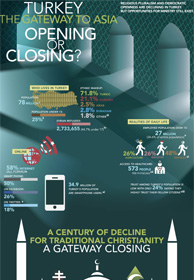Related Articles
The Anatomy of the Christian Mission
If it be true that second century Christians sometimes formed themselves into burial clubs in order to achieve a type of organization legal under Roman law, then that fact could give the Czechs, the Basques, and other oppressed minorities today some good ideas on how to run an underground church in an unconventional form.
The Anatomy of the Christian Mission
If it be true that second century Christians sometimes formed themselves into burial clubs in order to achieve a type of organization legal under Roman law, then that fact could give the Czechs, the Basques, and other oppressed minorities today some good ideas on how to run an underground church in an unconventional form.
The Anatomy of the Christian Mission
If it be true that second century Christians sometimes formed themselves into burial clubs in order to achieve a type of organization legal under Roman law, then that fact could give the Czechs, the Basques, and other oppressed minorities today some good ideas on how to run an underground church in an unconventional form.
Welcoming the Stranger
Presenter: Matthew Soerens, US Director of Church Mobilization, World Relief Description: Refugee and immigration issues have dominated headlines globally recently. While many American Christians view these…
Is Turkey, the Gateway to Asia, Opening or Closing?
Turkey is a key gateway between Asia and Europe, but is the door opening or closing? The answer is complex but worth diving in and exploring. Take some time to go in-depth into Turkey’s demographics, relationship with Christianity and current Evangelical Church.


